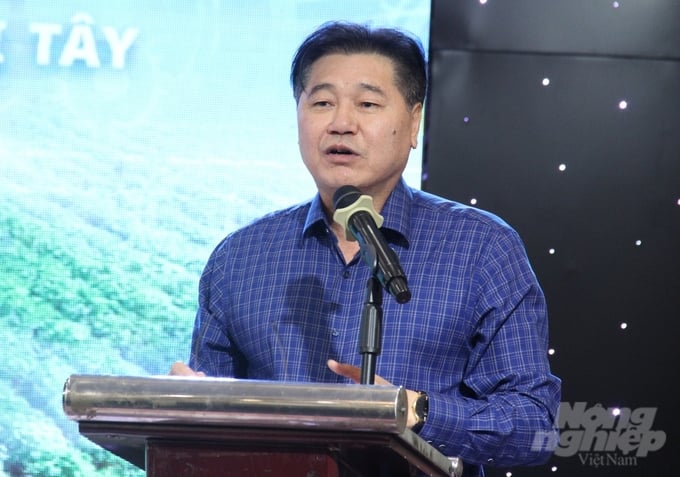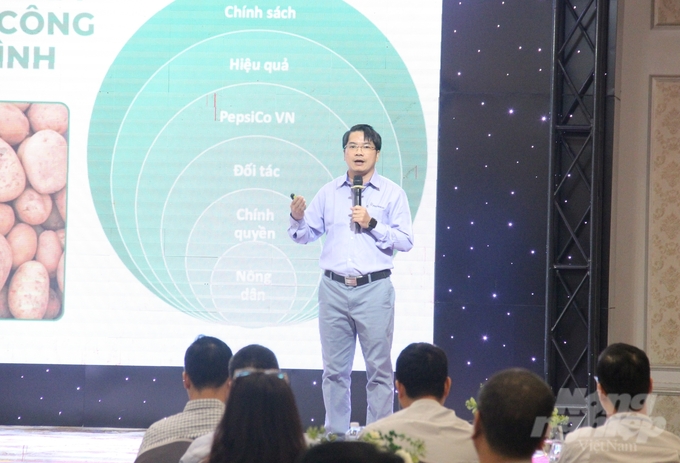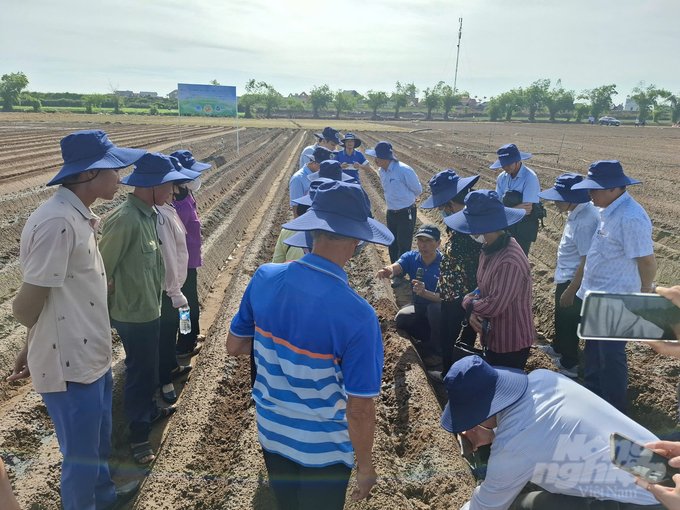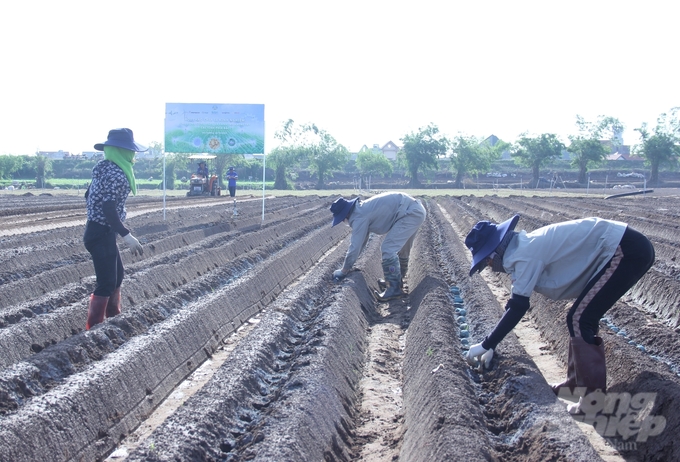May 30, 2025 | 18:12 GMT +7
May 30, 2025 | 18:12 GMT +7
Hotline: 0913.378.918
May 30, 2025 | 18:12 GMT +7
Hotline: 0913.378.918
The Public-Private Partnership (PPP) working group on vegetables, under the Partnership for Sustainable Agriculture in Vietnam (PSAV) by the Ministry of Agriculture and Rural Development, held a seminar on October 25 in Hai Duong Province to discuss experiences in applying technology and cultivating potatoes in the northern provinces of Vietnam.

According to Le Quoc Thanh, the Vietnamese potato industry possesses signfiicant development potential. Photo: Trung Quan.
The National Center for Agricultural Extension represents the public sector, while PepsiCo Vietnam and Syngenta Vietnam represent the private sector.
Le Quoc Thanh, General Director of the National Center for Agricultural Extension, stated that the Project for the Development of the Vegetable and Fruit Processing Industry for the years between 2021 and 2030 has received official approval from relevant authorities, with a goal of achieving an export value of 8 to 10 billion USD by 2030. The project aims to attract new investments in 50 to 60 large and medium-sized vegetable and fruit processing facilities. Furthermore, it aims to successfully build and develop several modern vegetable and fruit processing corporations and enterprises that are competitive on a regional and global scale.
With the aim of implementing activities under the project, the Ministry of Agriculture and Rural Development has established the Partnership for Sustainable Agriculture in Vietnam, comprising eight public-private partnership (PPP) working groups focused on several key commodities, including rice, coffee, tea, vegetables and fruits, seafood, pepper, agricultural chemicals, and livestock. They aim to connect stakeholders in the agricultural sector to share experiences and collaboratively develop value chains for Vietnam’s key agricultural products.
Despite its relatively recent establishment, the PPP working group on vegetables and fruits, co-chaired by the National Center for Agricultural Extension, PepsiCo, and Syngenta, has made promising efforts, particularly in developing the potato value chain.
At present, Vietnam possesses numerous advantages in potato production and export. Demand from processing plants is projected to reach up to 180,000 tons of raw materials per year. Domestic potato yield currently only meets 35 to 40% of this demand, with the remainder consisting of imports from various countries. This disparity indicates that the Vietnamese potato industry possesses significant development potential.

According to Nguyen Kim Hanh, PepsiCo's expansion of its potato raw material area into the northern regions provides farmers with additional crop options and opportunities for stable income. Photo: Trung Quan.
In the northern provinces, the annual area for winter crop production is approximately 400,000 hectares. Notably, potato cultivation area accounts for between 15,000 and 18,000 hectares, with a total yield ranging from 250,000 to 320,000 tons. However, with favorable land and weather conditions, the production potential for potatoes in the northern provinces can reach at least 150,000 to 200,000 hectares per year. This advantage presents a favorable environment for the development of a potato production chain, with a focus on processing.
Nonetheless, the biggest challenge facing potato production in the northern provinces is the high proportion of small-scale farming operations. Despite the growing concentrated production areas within the region, local potato production activities rely primarily on scattered and small-scale farms. This issue further exacerbates investment, quality management, and consumption efforts.
The existing potato cultivation area within the region lacks formal planning due to competition with other vegetables and fruits. Furthermore, a lack of coordination in production activities has resulted in low productivity and quality, high production costs, and inadequate control over seed quality management.
General Director Le Quoc Thanh emphasized that a strong collaboration in establishing potato raw material areas in association with processing and consumption is necessary to promote the rapid and sustainable development of the potato industry. Accordingly, farmers participating in the model can receive reliable seed sources and instructions on implementing a comprehensive set of advanced techniques for effective, safe potato cultivation that adapts to climate change and reduces emissions. On the other hand, local business communities are responsible for maintaining a stable supply of quality raw materials with certified origins.

As part of the seminar, a large number of farmers from the Red River Delta visited Thai Tan Commune in Nam Sach District (Hai Duong Province) to learn about advanced technology applications in potato cultivation. Photo: Trung Quan.
Nguyen Kim Hanh, Agricultural Director at PepsiCo Vietnam, noted that many farmers are reluctant to grow potatoes due to various challenges, including a lack of quality seed sources, unstable product markets, significant pest pressures, and the strict quality and food safety requirements imposed by processing companies.
In response to these challenges, businesses and partners have developed a closed production model that encompasses all stages of the potato cultivation process, including land preparation, seed treatment, pest control, fertilization, irrigation, cultivation techniques, product off-take, processing, and the use of renewable energy.
In 2023, PepsiCo, Syngenta, and partners in the value chain implemented a range of new technological solutions in potato production. The results showed an average yield of 30 to 34 tons per hectare. A pest management solution helped reduce pesticide applications by two sprays per crop cycle, thereby saving farmers 2 million VND per hectare. On the other hand, the use of drones decreased the amount of water needed for pesticide mixing by over ten times.
After more than a decade of cultivating potatoes in the Central Highlands and preparing raw material areas for PepsiCo's new food factory in Ha Nam Province, which has a projected annual yield of over 20,000 tons of snacks per year, PepsiCo has expanded its potato production model into the northern provinces. This expansion aims to establish a local supply chain of raw materials and provide high-quality products for the Vietnamese market.
The pilot models for raw material potato cultivation during the 2023-2024 winter-spring crop in Thanh Hoa and Hai Duong have produced outstanding results. Accordingly, potato yields were significantly higher, reaching 33 tons per hectare in Thanh Hoa. Consequently, the models allowed farmers to save water and earn higher incomes.

The pest management solution for potatoes reduces pesticide applications by two sprays per season, saving farmers 2 million VND per hectare. Photo: Trung Quan.
During the 2024-2025 winter-spring crop, PepsiCo will continue to collaborate with Syngenta and partners in the potato value chain to implement nine sustainable, high-tech potato production models in the Red River Delta provinces (Hai Duong, Thanh Hoa, Bac Giang, Thai Binh, Vinh Phuc, etc.), with a projected total area of 23 hectares.
PepsiCo Vietnam's expansion of its potato raw material area into the northern regions provides farmers with additional crop options and opportunities for stable income. In addition to advanced farming techniques and safe fertilizer and pesticide products, potato farmers in the northern region will receive guidance on enhancing their financial management and safe production practices. The company also assists households in adopting digital technologies in agriculture, such as using drones for field visits, managing cultivation practices, and adjusting irrigation directly through mobile applications.
Translated by Nguyen Hai Long

(VAN) Several scientists and farmers are experimenting with soil treatment in some key durian-growing regions such as Cai Lay (Tien Giang), Dak Song, Gia Nghia, and Dak R’lap (Dak Nong).
/2025/05/25/4127-3-073637_820.jpg)
(VAN) Thanks to the promotion from an FAO-implemented project, vegetable production in greenhouses in Moc Chau has seen strong development, from 1.5 hectares in 2021 to nearly 50 hectares in 2024.

(VAN) FAO has recently supported USD 140,000 to implement the project 'Risk mitigation human-animal interface risks through disease control initiatives in pig farming.'

(VAN) The People's Committee of Tra Vinh province has approved an adjustment to the investment policy for the Green Hydrogen Plant project, increasing its area to approximately 52.76 hectares.
![Reducing emissions from rice fields: [2] Farmers’ commitment to the soil](https://t.ex-cdn.com/nongnghiepmoitruong.vn/608w/files/news/2025/05/05/dsc08881jpg-nongnghiep-140632.jpg)
(VAN) Clean rice cultivation model in Thuong Tan commune, Bac Tan Uyen district, is assisting local residents in achieving sustainable agriculture by substantially reducing costs, increasing productivity, and protecting the environment.

(VAN) At the conference to disseminate Resolution No. 68, AgriS introduced its digital agricultural ecosystem and reaffirmed its commitment to accompanying the Government in promoting private sector development and sustainable agriculture.

(VAN) 'Blue Ocean - Blue Foods' initiative is designed to restore marine ecosystems and establish sustainable livelihoods for local communities by cultivating a minimum of 1,000 hectares of cottonii seaweed in the first three years.